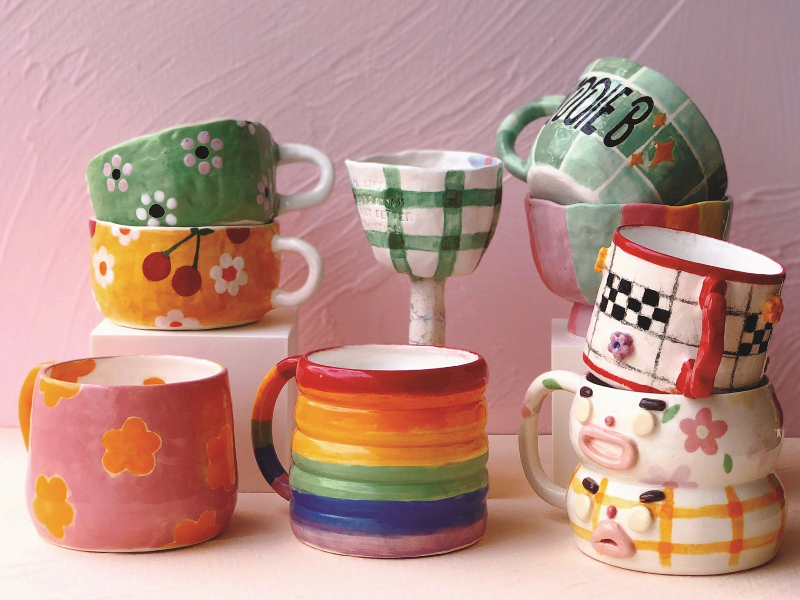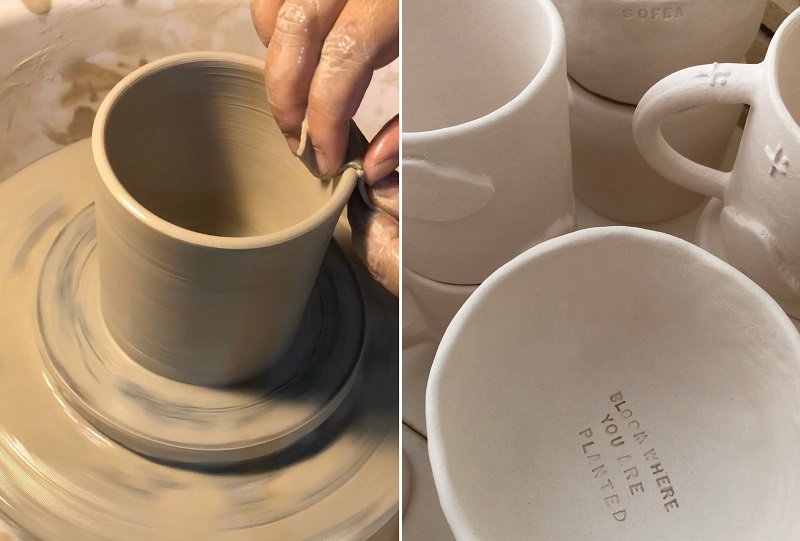
Shafina handmakes all her products (All photos: Shiramics)
A skill she learnt for fun in university came in handy for Shafina Hanafi after leaving business school. Like many other fresh graduates, she had a tough time securing a job. Apart from seeing an opportunity in the market, words of encouragement from friends motivated her to use her talent by starting a ceramics business.
Shafina had come across people who made a living out of the dying craft in other regions and wanted to do the same. She also aspired to make reasonably priced handmade ceramics in order to be more accessible to local consumers. “I would send pictures of the process, as well as finished products, to my friends and one of them said if I sold the ceramics, it would be a hit. I also noticed that many Malaysians loved to buy pottery and ceramics but would usually have to get them from the UK or North America, which is not very convenient,” she says.
As Shafina attended a Japanese course during her university days, she felt a special connection with the language and chose the name Shiramics to commemorate that. “In Japan, they use the katakana writing system to translate foreign words. ‘Shi’ is the first letter of my name in katakana. Coincidentally, the shape of the letter resembles a smiling face and I like that. Then I just combined it with the word ‘ceramics’,” she explains.
img-9130.jpg

Launched in March last year, Shiramics offers quirky and colourful mugs made using two techniques: handbuilding and wheel throwing. Undoubtedly, handmade goods are difficult and demanding to produce but it is especially tougher for ceramics as they are volatile and fragile, Shafina notes. “There are many stages to making the products. First, I think of a theme before doing rough sketches of the mugs in different shapes with different features. Then comes the real work; I mould them using a lump of clay, attach details such as stamping words or 3D features, and dry them.”
Using a second-hand ceramic kiln machine that she bought at half-price, Shafina moves on to the next crucial steps. “I will do the first firing — an important stage to remove chemicals and impurities to make sure the ceramics are safe for food consumption. Next, I will paint the bisque pieces and leave them to dry for about a week before dipping them in transparent glaze. The last and final stage is called glaze firing, in which the ceramics will be fired to 1,200° heat. If anything is done wrong during any of those steps, it will be apparent in the final product,” she says.
This tedious and time-consuming process to make one production run of 30 pieces takes between four and six weeks to complete. Considering the hours and resources needed to produce such delicate pieces, Shafina prices her creations accordingly, starting from RM70 per mug.
shiramics.jpg

“People who don’t follow me on Instagram — a platform where I document every process — but drop by my booth at pop-up events often ask why my products are priced this high. I use this as an opportunity to show them the behind-the-scenes [work] and why Shiramics’ items are valued this way,” she says.
After experimenting with different types of materials used to make tableware such as porcelain, earthenware and stoneware, Shafina decided on the last, which she sources from Australia. “When I started, I used locally sourced clay, but it didn’t give me the result I wanted. As for finishing, I use glaze from either Australia, the UK, the US or Canada.”
Shafina draws inspiration from her surroundings, be it plants or animals she lays eyes on, patterns of clothes or video games. “I make designs that speak to me directly. I would love to have an Animal Crossing theme collection someday.”
She hopes to put out a new release every month. Since its inception, the brand has launched 10 collections. However, running the business alone, from design planning and production to marketing and packing the products, is a challenge she still has not gotten used to. “I like to be transparent because interruptions and sleepless nights are inevitable for creative minds. As I struggle with ADHD, doing everything on my own consumes a lot of time because of the distraction that [crop up] along the way. I would paint for an hour and waste another two hours. Planning a schedule is important and knowing when to release a collection really helps,” she says.
With the support of understanding customers and uplifting acquaintances, Shafina manages to push through despite the setbacks. “I could not have done a good job without a loving community. People who buy my products are aware that handmade items often come with minor cosmetic flaws. When it comes to pre-orders or customisation, they understand when I am unable to deliver their orders on the agreed deadline due to unforeseen circumstances.”
Now operating from a rented studio a stone’s throw from her house, Shiramics is a fully online business that utilises Instagram promotion tools to attract the right audience. “Some things I learnt about Instagram marketing tips is that you need to use appropriate tags and get people to comment on your posts to increase engagement,” says Shafina.
The Kedah-born entrepreneur plans to participate in pop-up events in Kuala Lumpur twice a year and organise more workshops to interact with customers, who often become her friends after bonding over educational activities and casual conversations at such occasions.
This article first appeared on May 30, 2022 in The Edge Malaysia.


